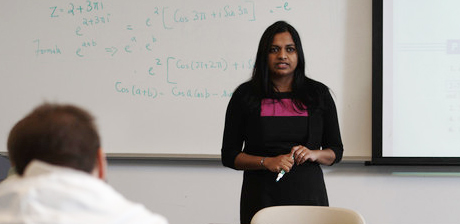October 20, 2014
Electrical engineering project maps facial expressions
Goal to help autistic individuals better understand social situations
Rajani Muraleedharan was raised in the sizzle of southern India.
Still, her move to America wasn’t met with the typical exasperation experienced by overseas imports more acquainted with temperatures surrounding the earth’s equator than the wintertime weather waiting stateside. Instead of irritation, she adopted that Dean Martin attitude.
Let it snow.
 “I was excited and looking forward to it,” the first-year assistant professor said about her relocation across the Atlantic in 2001. “In India, it always was just rain and sun, so I wanted to experience the snow. But, then I realized, I have to shovel this.”
“I was excited and looking forward to it,” the first-year assistant professor said about her relocation across the Atlantic in 2001. “In India, it always was just rain and sun, so I wanted to experience the snow. But, then I realized, I have to shovel this.”
That American adjustment became a labor of love, not unlike the many research endeavors that engaged her brain from those first days as a Ph.D. student in the classrooms of Syracuse University to today, at her office within Pioneer Hall.
Muraleedharan and her former colleagues at New Jersey’s Rowan University are developing a project aimed at mapping human emotions using facial expressions. She hopes the results will lead to many applications, including being able to anticipate harmful conduct by children as well as help autistic individuals better understand social situations.
“We want to use cameras to find out what they feel and predict their behavior,” she said.
A computer engineer from Rowan is designing a video game that Muraleedharan and her former psychology colleagues want to use as part of an initial phase involving autistic people. The simulation would teach the participants how various facial expressions indicate social circumstances. At the same time, the game user would be filmed, allowing researchers to gauge emotional reactions.
“We are hoping this will be a way to understand them better,” she said. She’s attempting to secure grant money for the research via avenues within SVSU as well as the National Institute of Health and the National Science Foundation.
Muraleedharan also hopes to recruit students from the undergraduate level to help assist the study. “When I had interactions with undergraduates, sometimes they had this (impression) that undergrads don’t do research,” she said, “but I believe in project based learning. I’m hoping they will help with the work.”
As Muraleedharan awaits funding opportunities, she said she remains engaged both in the classroom and at her new home in mid-Michigan. She moved here in August with her husband, Thomas Silveira. They have a 3 year-old daughter, Reyna, who shares her mom’s eagerness for new weather experiences. “Where I came from, there was no snow at all,” Muraleedharan said. “When we told our daughter (about relocating to Michigan), she was so ecstatic. She is looking forward to the snow.”
